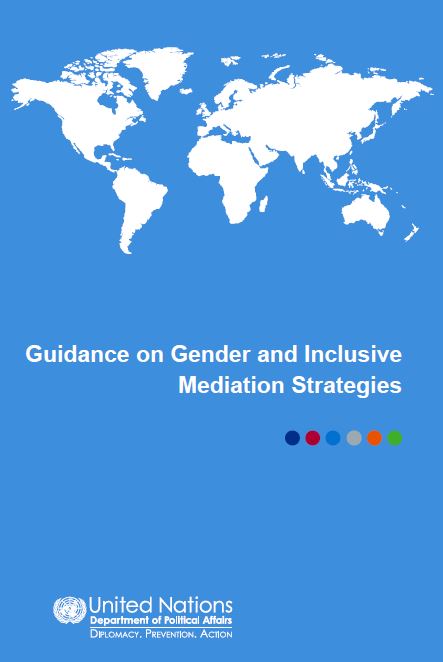Women like men have a fundamental right to participate in all relevant political decision making, including peace processes at all levels. Women’s inclusion in peace processes adds a broader range of perspectives and enhances the ability of peacemakers to address the concerns of a wider range of stakeholders, which can help build credibility of the process and broaden social buy-in, leading to more sustainable peace. Yet, women are often underrepresented or excluded from formal peace processes. Mediators, therefore need to promote understanding among conflict parties of the value of the participation of women.
While acknowledging that it is the conflict parties that largely determine who, how and when different actors are brought into the process, mediators nonetheless must make all possible efforts, such as champion women’s meaningful participation in party delegations, support independent delegations in the face of resistance, and ensure a multi-track approach that engages women civil society and women peacebuilders in designing a peace that is based on upholding women’s participation, protection and rights.
The UN Guidance on Gender and Inclusive Mediation Strategies provides mediation practitioners with practical tools for making their peacemaking efforts more inclusive and gender responsive. It includes information and guidance on how to put into practice the gender dimensions of the international normative frameworks and how to introduce a gendered perspective in mediation preparedness and process design. The Guidance also addresses substantive issues in a peace process, including security arrangements, conflict-related sexual violence, political participation, power sharing and constitutions, as well as the drafting and implementation of peace agreements.

This UN DPPA guidance seeks to inform mediators and their teams, as well as conflict parties, about the principles and strategies for the effective inclusion of women, as well as a gendered perspective, in mediation processes. The guidance addresses mediation preparation, process design, and substantive issues including security arrangements, participation, constitutions, language and the implementation of peace agreements through a gender lens.
Additional UN resources on women’s participation:
Inclusion is Not Altruism. It’s Self-Interest and It’s Fundamental
Interview with Martin Griffiths, former UN Special Envoy for Yemen, Under-Secretary-General for Humanitarian Affairs and Emergency Relief Coordinator.
Factoring in Diversity: On the Need for Inclusive, Gender Sensitive and Multitrack Mediation
Interview with Hanna Tetteh, the former UN Special Representative to the African Union, current UN Special Envoy for the Horn of Africa.
COVID-19 and Conflict: Advancing Women's Meaningful Participation in Ceasefires and Peace Processes
Addresses the importance of women's full, equal and meaningful participation to an effective pandemic response and to peacemaking efforts.
Helping Advance Women’s Political Rights in Ecuador
In partnership with UN Women Ecuador, DPPA backed efforts to address political violence against women, promoting the linkages between SDG 16 on peace, justice and strong institutions and SDG 5 on gender equality.
Women, Land and Conflict
Issues around land and conflict and why it’s important to protect women’s land rights for conflict prevention, mitigation and recovery, as explained by Ombretta Tempra, an expert on land and conflict with UN-Habitat based in Nairobi.
Palpable Momentum for Change: Towards Full Inclusion of Women in Search for Peace
UN DPA, DPKO and DFS mentorship event with women leaders working in special political missions and peacekeeping operations.
Women Mediator Networks
Women mediator networks aim to provide pools of experts who can contribute to inclusive peace processes.
Women, Peace and Security Agenda Comes into its Own
Inclusion for More Effective Peace Processes.
